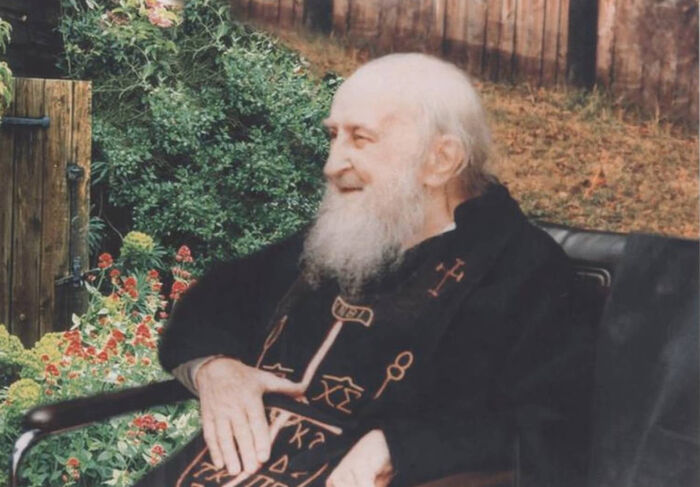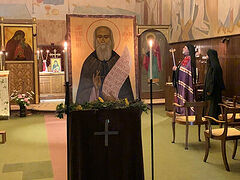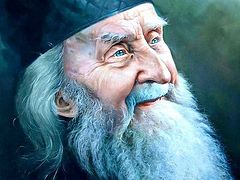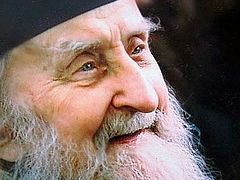In Christ’s famous words to Elder Silouan: “Keep your mind in hell and despair not,” we have the result of the spiritual experience of an ascetic, such as was Elder Silouan; such as was Fr. Sophrony—and we must strive to be the same. This is the essence of the consciousness of our sin, our infirmity, our remoteness from God before the face of His infinite love. Every Christian must acquire this experience, whatever his spiritual level. We cannot and should not copy the life of the holy ascetics, but our personal experience is always analogous (to the extent that we truly seek God) to the ascetic experience, of which Fr. Sophrony was one of the best witnesses…
When the experience of knowing God on the paths of our earthly life is as rich as that of Elder Silouan or Fr. Sophrony, this experience acquires eternal value, however it’s described—with ordinary words or the words of academics and theologians…
It’s wonderful to talk about what the spiritual life is, but it’s even better to pray for the whole world…
A monk, a hermit in the desert is not separated from the world. Upon deep reflection, we understand that we are ontologically connected in sin with the whole of humanity. When a saint such as Elder Silouan or Fr. Sophrony receives the experience of knowing the ocean of his sinfulness before the face of God’s mercy, he has nothing left but to turn to God—but together with the whole world, because he is connected with this world…
If the testimony of Fr. Sophrony is important, it’s because this testimony is above all an experiential testimony that goes beyond intellectual and theological reflection. By his very life, he communicates this experience to us. Here we encounter one of the remarkable features of Fr. Sophrony: He never sought to keep his personal experience for himself alone. He wanted his brothers (firstly the monks and nuns of his monastery, but also everyone else who came to him) to be able to get something from this experience. But, of course, he never did this out of vanity…
I knew Fr. Sophrony for about fifteen years. I remember our first encounter well. Immediately, from his first words, I could sense from his face and his words that this was a man of God before me…
I was struck by how direct a person Fr. Sophrony was. Every question that was put to him he managed to answer before the face of God, with extraordinary love, but also with very great honesty…
Fr. Sophrony’s life was always adorned with humor. In my love for wordplay, the word “humor” always seemed to me to be connected with two words: humility and love (in French: “humilite” and “amour”). I think Fr. Sophrony’s sense of humor was a testament to the humility and love that lived in his heart. When he laughed, it was bursts of laughter. I never saw him even once without him bursting into this extraordinary laughter, manifesting his heartfelt joy. But at the same time, he was always serious.
The last time I saw him before I decided to found the Monastery of St. Silouan, I asked him: “Father, do you really think I should do this?” I was shaking a little bit, because it seemed like an unlikely gamble. For encouragement, he said these fearful words to me: “This is an impossible task, but do it. But know that it won’t work out but with tears and blood.” Then he added: “And anyways, what else can you do? You can’t turn back. Is there an abyss in front of you? Jump, jump!” And then he erupted into loud laughter: “I’ve already jumped, now it’s your turn!”...
And here are some more words I love to remember in various circumstances. The monastery was already founded, and I would sometimes address Fr. Sophrony with lamentations, telling him about the vicissitudes, misfortunes, and difficulties of the initial period. He heard me out, as always, with great love and kindness. Finally, one day he said:
“Listen, it’s the same with me! Although I can’t quibble with God, because He has given me—quite sparingly, of course—the ability not to quibble with Him. So do as I do!”…
Fr. Sophrony had a special personal closeness to God. The last time I saw him alive was when I received the monastic mantia in his presence. He came into the small room where I was getting ready to go into church, and said: “I’ve come on important business.” And, making a cross with two fingers, he added: “Now, until the end of your life—cross, cross, cross!” Seeing that I became even more afraid, he continued: “But don’t worry! Look at me! God did what He could with me; maybe it turned out well, I don’t know. He can judge. But you know that our God sometimes acts ‘recklessly!’”
Association Saint Silouan l'Athonite. Bulletin. N 1/1994, pp. 8-9




